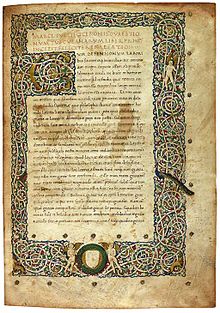Tusculanae Disputationes
The Tusculanae Disputationes (also Tusculanae Quaestiones; English: Tusculanes or Tusculan Disputations), is a series of books written by Cicero, around 45 BC,[1] attempting to popularise Stoic philosophy in Ancient Rome.[2] It is so called as it was reportedly written at his villa in Tusculum.

Context
This section is empty. You can help by adding to it. (June 2014) |
Themes
The Tusculan Disputations is the locus classicus of the legend of the Sword of Damocles, as well as of the sole mention of cultura animi as an agricultural metaphor for human culture.[3][4] Cicero also mentions disapprovingly Amafinius, one of the first Latin writers on philosophy in Rome.
Books
The Tusculanae Disputationes consist of five books:
- "On the contempt of death"
- "On bearing pain"
- "On grief of mind"
- "On other perturbations of the mind"
- "Whether virtue alone be sufficient for a happy life"
Influence
The rhetor's theme De contemptu mundi, on the contempt of the world, was taken up by Boethius in the troubled closing phase of Late Antiquity and by Bernard of Cluny in the first half of the 12th century.[citation needed]
Thomas Jefferson included the "Tusculan questions", along with Cicero's De Officiis, in his list of recommendations to Robert Skipwith of books for a general personal library.[5]
Notes
- ^ King, J., Tusculan Disputations: Introduction. Loeb Classical Library. (1927).
- ^ Marcía L. Colish (1990). The Stoic Tradition from Antiquity to the Early Middle Ages: Stoicism in classical latin literature. I. BRILL. pp. 458–. ISBN 90-04-09327-3.
- ^ "Culture". Vocabulary.com. Retrieved 5 January 2014.
- ^ Cicero, Marcus Tullius (45 BC). Tusculanes (Tusculan Disputations). pp. II, 15.
{{cite book}}: Check date values in:|year=(help) - ^ Jefferson, Thomas (1952) [letter written August 3, 1771]. A Virginia Gentleman's Library. Williamsburg, Virginia: Colonial Williamsburg. p. 14.
References
External links
 Latin Wikisource has original text related to this article: Tusculanæ Disputationes
Latin Wikisource has original text related to this article: Tusculanæ Disputationes- Tusculan Disputations at Internet Archive, Charles Duke Yonge, translator (1877; reprinted 1888)
 Tusculan Disputations public domain audiobook at LibriVox, Charles Duke Yonge, translator (1877; reprinted 1888)
Tusculan Disputations public domain audiobook at LibriVox, Charles Duke Yonge, translator (1877; reprinted 1888)
- Tusculan Disputations at Project Gutenberg, Charles Duke Yonge, translator (1877)
- Cicero's Tusculan Disputations – Andrew Peabody, translator (1886)
- Tusculanae Disputationes – Latin hypertext at Perseus
- Marcus Tullius Cicero (2009). Tusculian Disputations. General Books LLC. ISBN 978-1-150-19578-5. (Google Books)
- Tusculan Disputations – Chapter Summaries
- Tusculan Disputations Book 4 (On the Passions) – Parallel Latin & English

